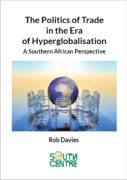Digital Industrialization
Unpacking the WTO MC13 Decision on the Work Programme on Electronic Commerce
By Vahini Naidu
The 13th Ministerial Conference (MC13) of the World Trade Organization (WTO) adopted a decision that marks a pivotal shift in the operational framework of the Work Programme on Electronic Commerce (WPEC) of the organisation. This Policy Brief examines how this Decision can enhance the trajectory of the e-commerce discourse within the WTO, elaborates on its implications and makes recommendations aimed at facilitating developing countries’ engagement in the WPEC.
(more…)
WTO Moratorium on Customs Duties on Electronic Transmissions: How much tariff revenue have developing countries lost?
By Rashmi Banga
This research paper highlights the adverse impacts of the continuing WTO moratorium on customs duties on electronic transmissions on the developing and least developed countries. The rapidly progressing digitalization along with the ongoing pandemic and the food crisis are creating multiple demands on the government revenues. However, because of the moratorium almost all developing, and least developed countries are losing tariff revenues especially at the time when they are most needed. Not only are they losing the fiscal space but are also losing their regulatory space as they are unable to regulate the growing imports of digitizable products, especially of luxury items like the movies, music and video games. It is estimated that in the period 2017-2020, developing countries and LDCs lost $56 billion of tariff revenue, of which $48 billion were lost by the developing countries and $8 billion by the least developed countries. It is interesting to note that this loss of tariff revenue is from the imports of just 49 products (at HS six-digit). With no clarity on the definition of electronic transmissions (ET) and thereby on the scope of the moratorium, the continuation of the WTO moratorium on customs duties on ET can lead to substantive tariff revenue losses for developing and least developed countries in the future.
(more…)
Technology and inequality: can we decolonise the digital world?
By Padmashree Gehl Sampath
In this article, the author argues that techno-centric explanations of progress and industrialisation are deeply entrenched in a wider social context that encourages us to ignore the historical roots of current inequalities – which, in fact, are not amenable to a technological solution alone. Making the data economy work for all will require a serious reflection on how we want to frame this debate, and how to align ourselves to a common vision of social progress that technology could help to accomplish.
(more…)
The Politics of Trade in the Era of Hyperglobalisation: A Southern African Perspective
 About the Book:
About the Book:
Matters of international trade are increasingly widely recognised as major shapers of global politics. News bulletins are giving more and more coverage to matters like the so-called “trade wars” between the United States and China. These are, indeed, increasingly defining relations between the two largest economies in the world and could well underpin a multi-dimensional rivalry that could be a central feature of international relations for many years to come. Brexit is dominating and indeed re-shaping politics in the United Kingdom. By definition a rejection of a regional integration arrangement, Brexit has also revealed under-currents profoundly shaped by the outcome of a broader trade-driven process called “globalisation”. Just as regional integration is weakening in Europe, African countries have taken decisions that could lead to the most profound and ambitious step forward in African regional integration – the establishment of an African Continental Free Trade Area (AfCFTA). This study seeks to present an analysis of the political economy of trade negotiations over the past quarter century on two main fronts: the multi-lateral and those pertaining to regional integration on the African continent.
Author: Rob Davies is former South African Minister of Trade and Industry.
(more…)
Title: Setting Global Trade Rules on Electronic Commerce (E-Commerce) – Opportunities, Challenges, Perspectives and the impact on developing countries, specific to Small, vulnerable economies (SVEs), small island developing States (SIDs), and Least Developed Countries (LDCs).
Date: 1 April 2019
Venue: Palais des Nations, Geneva, Switzerland
(more…)
Digital economy policies for developing countries
By Parminder Jeet Singh
Digital economy is a given, as much as industrialization was inevitable on invention of means of incorporating steam and later fossil fuel and electric power into manufacturing. It is not a matter of being for or against it. It is about what kind of digital economy we should have. A development agenda for digital economy needs to be articulated, based on a narrative that takes proper account of developing country interests. (more…)













 About the Book:
About the Book: